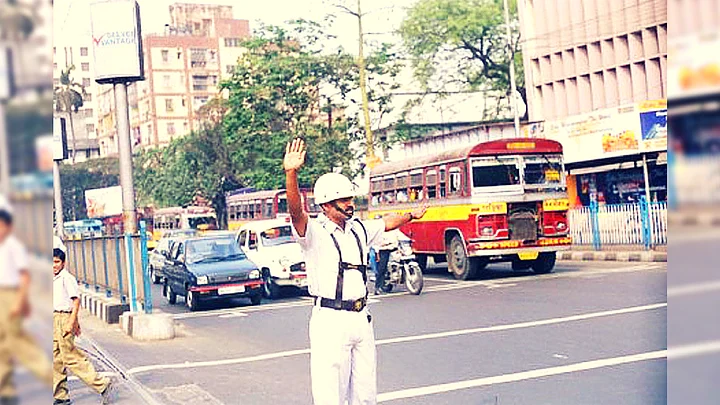Traffic intersections largely in Kolkata, and wherever they exist in the rest of Bengal, have been the sites of oddity since May 2011 when the Mamata Banerjee-led Trinamool Congress trounced the Left Front regime.The ones in Kolkata would have concealed mics that would blare doleful and melancholic Rabindra Sangeet all day long.
The mics have, mercifully, fallen silent. But what you won’t fail to notice at these traffic signals are odd pairs of law enforcers: the white uniform-clad Kolkata Police cops and the beat-up civic or “half-police” as they are pejoratively described.
The “half-police” are objects of Calcuttans’ ridicule since they are neither cops with any substantive authority to enforce traffic rules nor do they have the power to issue challans against violators.
They strictly do not assist the police in investigating criminal cases. One reason why no Calcuttan takes the “half police” (haap pulish in corrupted Bengali) seriously is their turnout – dirty uniforms, which are either a combination of blue or green.
In the district headquarters, however, the civic policeman’s uniform is a combination of a white T-shirt and khaki trousers with a sweat-and-grime-tainted cap. At a traffic intersection on the Eastern Metropolitan Bypass, which of late has become a busy arterial road that Calcuttans use to commute from south to north, Zaheer Abbas, attired in a soiled blue uniform, bemoans his situation in the midst of grime and automobile smoke.
“I get a salary of about Rs 10,000 per month but that is not sufficient since I am married and have a school-going daughter,” Abbas, scratching his cheeks that have scattered offshoots of beard, said as the walkie-talkie in his breast pocket crackled. “But at least this amount is of some value for someone who was a bekaar (unemployed),” Abbas added.
The scheme to provide jobs to Bengal’s unemployed youth began after Mamata Banerjee swept to power. In its dying days in power, the CPI(M)-led Left Front government launched the sop still in its infancy. But once the TMC took charge of the state secretariat, it extended the scheme to its own unemployed cadres across the teeming population of Bengal.
An estimated 80,000 unemployed people across Bengal are now part of the civic police force.Deepak Ghosh, Former Secretary to the State Government
Beyond Kolkata, in the districts, the “half police” are a replacement for the khaki-clad police who are no longer visible. Those who have been recruited are TMC supporters or unemployed youth who could be attracted to the party fold by dangling the carrot of being part of the state administration “which is actually vanishing” as Ghosh puts it.
According to Ghosh, the showering of political patronage among the unemployed has ensured a “solid and trusted” voter base, especially in the rural areas. In Nalhati in Birbhum, Golam Hasnat, 26, admitted that as one among Bengal’s armies of the unemployed, the job of a civic police is a blessing, especially because he has a family to support.
A salary of Rs 5,500 is not enough but a bekaar chhele (unemployed youth) cannot complain.
His “duty hours” have been cut from eight to six hours because of the rising heat across the state. “Sarkar has been considerate,” Hasnat’s half-police partner Mihir Mal, 32, said.
The eligibility criteria were purposely kept low. So those who studied up to Class VIII, IX and X may apply for the post of a civic police volunteer. The age limit was fixed between 20 and 30 years.
Once selected, a “half police” would undergo a short training course for 10 days at the respective district police lines. There is, however, no proposal to upgrade the training or skills. Their duties vary from assisting the normal police in traffic management, major festivals, taking action against parking violations, ensuring public safety.
A thousand-man civic police force was raised for the Howrah district in 2012. Under the scheme, employment would be for a year and each of the civic policemen would receive an honorarium of Rs 141.81 per day. More recently, the half-police across the state have been given medical insurance cover.
In February this year, the Mamata regime sought to hike the salary of the civic police from Rs 5,500 to Rs 10,000. It was proposed that they would receive Rs 2 lakh as “terminal benefit” on “attaining the age of 60.” This additional sop was put on hold once the model of code of conduct kicked in when the election dates were announced by the Election Commission.
(At The Quint, we question everything. Play an active role in shaping our journalism by becoming a member today.)
